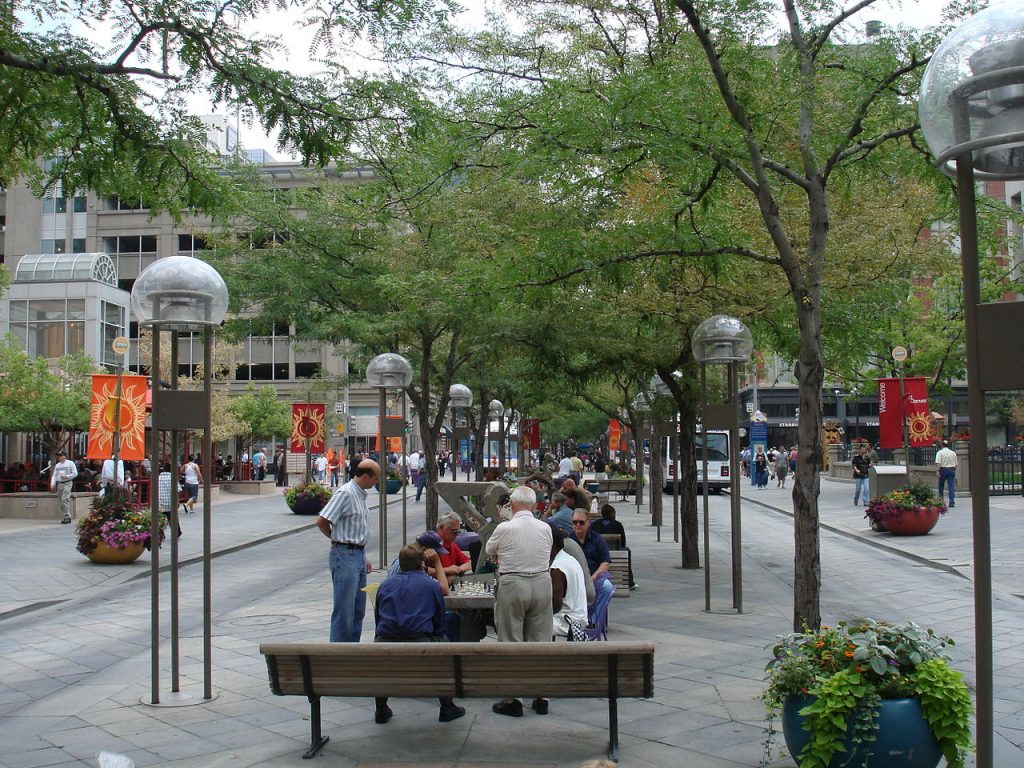What’s Next for Downtown Denver?
All the city news you can use.

16th Street Mall in Denver, CO. Photo by User: Stilfehler at wikivoyage shared, (CC BY-SA 1.0), via Wikimedia Commons
Every day at The Overhead Wire we sort through over 1,500 news items about cities and share the best ones with our email list. At the end of the week, we take some of the most popular stories and share them with Urban Milwaukee readers. They are national (or international) links, sometimes entertaining and sometimes absurd, but hopefully useful.
Different thinking on gentrification: Author Leslie Kern wonders if we’re hitting the wrong targets in discussions about gentrification. Hipsters and pour over coffee are symptoms of a larger problem with the capitalist instincts of multi-national real estate companies that change neighborhoods over time. (Leslie Kern | The Guardian)
The future of downtown Denver: Denver Colorado’s downtown has been hit especially hard by the pandemic, but many of the problems started before that including vacant storefronts and increasing levels of homelessness. Now city leaders are imagining solutions in order to bring back 100,000 workers through improvements to the 16th Street Mall, office spaces, and nightlife. (Daliah Singer | 5280 Magazine)
Phoenix’s ancient watery secret: The valley in which the City of Phoenix sits now was once the domain of the Hohokam civilization. Between 100 and 1450AD, they built a series of canals to funnel just 7 inches of rain annually to 100,000 acres of farmland. The amount of collective work that it took to keep up 180 miles of canals in an arid region is quite amazing. (Keridwen Cornelius | BBC Travel)
Why are Black families leaving cities: Over the last 50 years, the Black population in the 40 largest cities has gone from 40% to 24%. While some might believe gentrification is playing a role, that story doesn’t seem to work out in the data. The change has many different possible stories, including the suburbanization of jobs and population but as high and middle income Black families were able to leave, lower income families were not. (Jerusalem Demsas | The Atlantic)
Quote of the Week
Transportation mobility is fundamental to economic mobility. Low-wage workers commonly occupy entry-level positions where they must commute to work. But their commutes are fragile — one missed bus, one flat bicycle tire, or one deferred car repair can easily spell job loss…again. Transportation insecurity traps them in a game of Chutes and Ladders in which there are only chutes.
–Karina Ricks discussing transportation insecurity and what it will take to get to universal basic mobility.
This week on the podcast, Nolan Gray talks about his new book, “Arbitrary Lines: How Zoning Broke the American City and How to Fix It.”
Want more links to read? Visit The Overhead Wire and signup.
Urban Reads
-
Congestion Pricing Cuts Air Pollution in New York City
 Dec 14th, 2025 by Jeff Wood
Dec 14th, 2025 by Jeff Wood
-
We Think We Love to Drive. But Do We Really?
 Dec 7th, 2025 by Jeff Wood
Dec 7th, 2025 by Jeff Wood
-
Can Scott Wiener Tackle America’s Housing Crisis?
 Nov 23rd, 2025 by Jeff Wood
Nov 23rd, 2025 by Jeff Wood





















